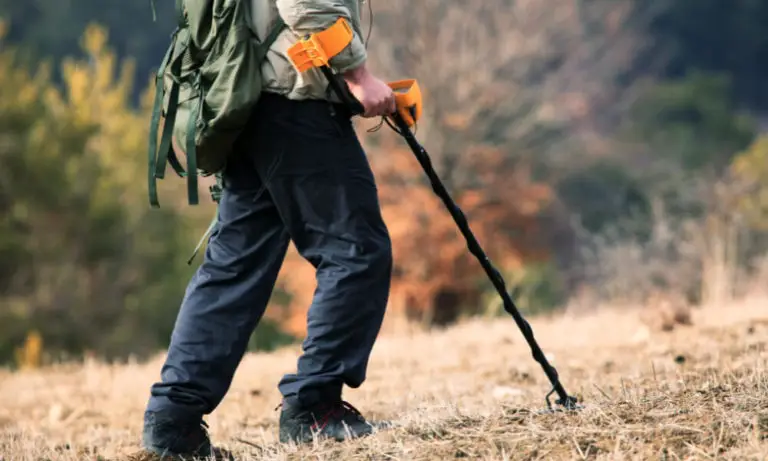Depending on the place you are going to hunt, you might need a license for a metal detector. Using a metal detector is a great hobby, but to ensure you don’t end up in an unwanted situation, you should know the law. In this article, I’m going to share some of the most important information regarding the US metal detecting laws with you.
At the end, I’ve proactively included the best metal detector brands list for you to have a look at the top options on the market in 2021.
The Importance of Responsible Metal Detecting
Before starting your adventure with metal detecting, be sure that you follow the regulations.
If you plan on using a metal detector in another country while traveling, be sure that you are aware of the law and its implications.
Some places have special regulations to prevent the destruction of nature or historic heritage, as well as a host of other reasons.
Do You Need a License to Use a Metal Detector?
Yes, some states require a license to use and own a metal detector.
Once you get approved and licensed, hunting becomes much easier as there are many sites that you use without additional permission.
No matter the types of metal detectors you use, you need a license to operate them in the USA.
Metal Detecting Laws
Fans of metal detecting are affected by the same laws as history buffs, treasure hunters, and rockhounds.
There are two federal laws that you must bear in mind while going on a hunt:
According to these two documents, metal hunting on federal land is almost always forbidden.
Those regulations were created with the thought of protecting the history of certain places.
While hunting, you also have to remember that you must obey state laws, which vary from state to state.
Federal Laws
The Antiquities Act of 1906 was created before metal detectors were invented.
Why does it apply to us as metal detecting enthusiasts? It states that any kind of excavation, injuring, or appropriating of historic or prehistoric monuments or ruins that are located on lands that the Government of the United States controls or owns are illegal acts.
The second law mention above makes it illegal to dig, disturb, or pick up anything that is 100 years old and located on federal property.
Consequently, metal detecting is banned in all national parks and US federal lands.
While going for a hunt, be sure that you do not enter any of those places with a metal detector in your car. You could be arrested just for having it in your trunk.
State Laws
In 34 states, you need a special permit to use a metal detector. 16 states don’t allow using it for recreational purposes on state property.
The 34 states that allow metal hunting have additional limitations within state park boundaries.
I strongly advise you to check the regulations with a park ranger and always stick to the rules. Special regulations may also apply to navigable rivers, state highways, wildlife management areas, etc.
Metal Detecting Laws – In General
Generally speaking, according to regulations, hunting on any federal and state land is usually off limits.
The exception is a situation where you get special permission.
Some states and counties also prohibit using metal detectors in public parks.
Metal Detecting Laws – State Park Regulations
In the table below, you can find information about metal detecting the applicable state park regulations to bear in mind.
| STATE | PERMITTED | NOTES |
| Alabama | Yes | Need permission from park manager |
| Alaska | Yes | Only allowed in some parks. Check with local office |
| Arizona | Yes | Need permission from park ranger |
| Arkansas | Yes | Beach areas in some parks require permits from the park office |
| California | Yes | Need permission from park office |
| Colorado | Yes | Need permission from park manager |
| Connecticut | Yes | Allowed on beaches. Other areas only allow surface collection. No digging. |
| Delaware | Yes | Only on beach areas |
| Florida | Yes | Only on beach areas with permission from park manager |
| Georgia | No | |
| Hawaii | Yes | Only on beach areas |
| Idaho | Yes | Most parks allow metal detecting, but you cannot remove found objects from the parks |
| Illinois | Yes | Need permission from park office |
| Indiana | Yes | Only on beach areas and with permission from the Park Manager |
| Iowa | Yes | Only on beach areas |
| Kansas | Yes | Most beaches, excluding those that are federal lands |
| Kentucky | No | |
| Louisiana | No | |
| Maine | Yes | Need permission from park office |
| Maryland | Yes | Only beach areas, but need permission to use metal detectors. Point Lookout and Calvert Cliffs beaches are off limits |
| Massachusetts | Yes | Need permission of the park supervisor to use detector on beach and campsites |
| Michigan | Yes | Verify with local authorities. Some parks are completely open, some closed, some with restricted areas. |
| Minnesota | No | |
| Mississippi | No | |
| Missouri | Yes | On beach areas only. Need permission from DNR |
| Montana | Yes | Allowed, but you cannot remove anything from parks. |
| Nebraska | Yes | Allowed on some beaches below vegetation line |
| Nevada | Yes | Needs permission of the park office |
| New Hampshire | Yes | Most areas allow metal detecting |
| New Jersey | Yes | Needs permission of the park superintendent |
| New Mexico | No | |
| New York | Yes | Only on beach areas with permit from the park manager |
| North Carolina | No | |
| North Dakota | No | |
| Ohio | Yes | Only on beach areas with permit from the park manager |
| Oklahoma | Yes | Needs permit from the park office |
| Oregon | Yes | Needs permit from the park office |
| Pennsylvania | Yes | Needs permit from the park office |
| Rhode Island | Yes | |
| South Carolina | Yes | Only beach areas with permit from park official |
| South Dakota | Yes | Needs permit from the park office |
| Tennessee | No | |
| Texas | No | |
| Utah | No | |
| Vermont | Yes | Needs permit from the park office |
| Virginia | Yes | Needs permit from the park manager |
| Washington | Yes | Allowed in 67 parks with permit |
| West Virginia | – | |
| Wisconsin | No | |
| Wyoming | Yes | Needs permit from the park superintendent |
Where Can You Use a Metal Detector Legally?
Depending on the site where you want to hunt, you might need to contact an entity for the permit to use a metal detector.
If you’re as enthusiastic as I am about the past time, it’s worth it.
Private Property Hunting
If you want to hunt in your own backyard, you don’t need anyone’s permission to do it.
However, this rule doesn’t apply if your private property is also:
- A historical site
- A tribal burial ground
- An archaeological site
If that’s the case, you must probably know about it, but if you’re not sure, verify this with authorities first.
Metal Detecting Outside of Your Private Property
As a metal detector lover, you have most probably already checked every inch of your land.
If you want to expand your search, be sure that you obey all regulations.
Hunting on Someone’s Else Property
In case you want to enter someone else’s property to hunt, you need clear permission from its owner.
Would you want to see someone searching for stuff on your land? If you were to just appear with a metal detector on someone’s property you might be treated as an intruder and the person can call law enforcement officers to solve the issue. I’m sure you don’t want that.
Hunting at a Park
Parks are great places for a metal hunt. Before you go hunting in this place, contact local officials. In most cases, they can give you special permission to search.
Remember to check the table above to verify if the state allows you to search in state parks.
Other Places in Which You Might Need Special Permission
Generally, just imagine that if you want to hunt outside of your fence, you likely need permission to do so.
Some of the other places that might require permission are:
- Ghost towns
- Disused amusement parks
- Ranches and farmlands
- Some beaches and lakes
- Resorts
How To Ask for Permission to Hunt on Someone’s Land
I know that asking for permission to hunt is not always a good experience.
However, if you want to use your metal detector legally, you have to learn how to face the owners of lands you want to search.
I want to share a few tips with you that help me to get more ‘yes’ than ‘no’ answers.
Be polite
Whether you’re dealing with a super nice owner or someone you would rather avoid, never lose your grip. Sometimes the most grumpy owners are willing to allow you to search their property if you simply keep being nice.
Share what you are going to do
Be clear about the techniques you’re going to use. Try to avoid metal detector hunter jargon.
Terms that might be obvious for you might be confusing for landowners.
Share information on interesting facts about the property
Are you going to search a historic property? Do you know any story that makes this particular place interesting for you? If yes, share it with the owner.
The person might appreciate that you did your research and understand why you want to search better.
Leave the property better than you found it
If you find trash, pick it up. Be sure to not leave any damages behind you.
Get it on paper
Before you start your search, be sure to write down all the granted permissions. The document should include information about when and where you are going to hunt.
You can also include the type of equipment you are going to use. The file should include information about what you are going to do with the finds and contact details for you and the landowner.
Always keep this paper on you while searching in case of attempted intervention by a suspicious neighbor or law enforcement.
Is It Illegal To Use a Metal Detector on the Beach?
Once you get permission for using a metal detector, you may hunt in various places. Beaches are usually a great place for hunting.
While the good news is that you can hunt on them, some regulations may apply.
Before hunting, check the policies of the beach you want to search.
Each beach has its own regulations you must adhere to. Some of them allow hunting in the water, while others don’t.
There are some general rules that every metal detector enthusiast should remember:
- Never hunt in restricted areas.
- Stay between the marks of low and high tide.
- Don’t enter any vegetation areas.
While public beaches are quite readily available for metal detectorists, you might face some limits with privately-owned beaches.
If you want to search on the land of a private owner, remember to ask for permission to do so and make it official with documentation.
If you decide to hunt on the beach, you should carefully pick your metal detector. I recommend this one. It is waterproof, so you can expand your search beyond the land.
Public Places to Metal Detect Near Me
There are various places that you can go hunting around you.
That includes:
- Your own backyard
- Parks
- Lakes and rivers
- Beaches
- Fields
If you use geolocation on your phone or computer, you can always search Google, using the phrase “public places to metal detect near me” to receive updated information about places that are available in your area.
Where Can You Legally Metal Detect Without Permission?
The only place that you can metal detect without permission is your private property.
In other places, everything depends on what the local laws are. If there are no state laws that regulate this matter, reach for the federal or county laws.
I can assure you that in most places it is not so hard to get a permit. Usually, they are also free, so you don’t have to worry that your hobby is going to be expensive.
Once you get a permit to go for a hunt, remember to follow common sense.
A permit doesn’t mean you can do whatever you want to. Respect the place that you explore and leave it in good shape when you end your hunt.
Why Is Metal Detecting Illegal?
Metal detecting is an amazing and rewarding hobby. As you already know, in most states you can use a metal detector if you obtain federal, state, or local permission.
However, in most places, you have some limitations. Some countries have made metal detecting illegal.
Here are some reasons why that has happened:
People Misuse Metal Detectors
A metal detector is a great tool but it can be used for the wrong purposes. If someone searches for items, they might want to take them for themselves when they shouldn’t.
In this situation, the state or even the country can lose some priceless objects.
People Destroy Nature
Some areas are strictly out of bounds for any digging or even walking. They can include national parks, dunes, or places with vegetation or endangered species of plants.
When people do not follow the rules, those protected places can be completely destroyed.
Political Reasons
In some countries, authorities simply don’t want people to search for anything in the ground.
List of the Countries That Prohibit or Strictly Limit Metal Detecting
| Country | Notes |
| Belarus | While the law allows some use of metal detectors, for amateurs, it is practically forbidden |
| Belgium | Individuals cannot look for archaeological artifacts |
| China | Metal detecting strictly forbidden |
| Comoros Islands | Metal detecting strictly forbidden |
| Cuba | Metal detecting strictly forbidden |
| Cyprus | Metal detecting strictly forbidden |
| Ethiopia | Metal detecting strictly forbidden |
| Iceland | Metal detecting strictly forbidden |
| Israel | Searching for historic artifacts is forbidden |
| Jordan | Metal detecting strictly forbidden for private individuals |
| Libya | Metal detecting strictly forbidden |
| Malta | Metal detecting strictly forbidden for private individuals |
| Moldova | Metal detecting strictly forbidden since 2011 |
| Mongolia | Metal detecting strictly forbidden |
| Morocco | Metal detecting strictly forbidden |
| Namibia | Searching for historic artifacts is forbidden |
| Philippines | Searching for historic artifacts is forbidden |
| Portugal | Metal detecting is officially prohibited but there are a few treasure hunting clubs that have permission to use metal detectors |
| Poland | Forbidden even on a person’s property. You can get special permission from archaeology institutes, but it is very hard |
| Russia | Searching for historic artifacts is forbidden |
| Saudi Arabia | Metal detecting strictly forbidden |
| Sri Lanka | Metal detecting strictly forbidden |
| Sweden | Metal detecting strictly forbidden |
| Tunisia | Metal detecting strictly forbidden |
Quick Best Metal Detectors List
Now that you know about the laws and regulations you have to have in mind while going for a hunt, let’s have a look at the best metal detectors that you can get in 2021:
| Metal Detector | Pros | Cons |
| Garrett ACE 300 Metal Detector |
|
|
| Esright Metal Detector for Adult |
|
|
| Weanas Metal Detector for Adults |
|
|
Conclusion
I hope this information made the hunting regulations clearer for you. The golden rule that I’ve been echoing is very clear.
If you are not sure what laws you should follow, contact local authorities. It is better to ask twice than having to end your metal detecting in a very unpleasant way.



